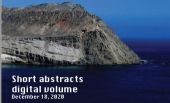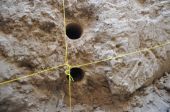INQUA PERIBALTIC Working Group Int'l Field Symposium: Quaternary evolution of the Eastern Baltic region: from glaciations and interglacials to the recent global warming, 4-10 October 2020
Posted by Christoph Grützner in TERPRO News on 30 Nov 2019
Update 2020-03-24:
Due to the Corona situation, the meeting will be postponed from May to 4-10 October 2020.
*******************************************************************************************************************
Organizers:
- Institute of Geology and Geography, Nature Research Centre (Lithuania)
- Lithuanian Geological Survey
- University of Latvia
- Latvian Association for Quaternary Research
- Geological Society of Lithuania
- INQUA Peribaltic Working Group
Format and venue:
The field symposium will be held along the Eastern Baltic coast – from Kolkas Rags (Western Latvia) to Ventės Ragas (Western Lithuania). The Symposium will be focus on different topics of Quaternary geology: glacial geology, stratigraphy, palaeogeography, glaciotectonics, palaeoseismology, the Baltic Sea evolution and related glacio-isostatic rebound, peculiarities of the Curonian Spit development (aeolian processes, palesols, dune tectonics), the human influence to the recent geological and related environmental processes (global warming, sea level changes, coastal erosion, etc.). The Symposium will consist of one-day conference (oral and poster presentations) and four days of field excursions.
On 9th of May, the participants will depart to the Symposium venue from Vilnius, Lithuania (at 14 p.m.) and on the way will stop in the Riga International Airport (at 18 p.m.) where the arrival of participants is also possible. At the end of the Symposium (15th of May) all the participants will be transported directly to Vilnius (the earliest possible arrival – about 12 a.m.).
Registration and registration fee:
The potential participants are kindly invited to fill in the registration form and return via e-mail before the 20th of December 2019 to secretary of the Symposium Aldona Damušytė (e-mail: [email protected]). The preliminary registration fee will be about 470-500 EUR and will cover transportation, accommodation, full board, and conference materials. The final fee, as well as possible discount for PhD students, depends on the total number of participants and financial support of potential sponsors. Please note that the registration fee does not cover any health insurance, also travel cost and extra accommodation before and after Symposium. A number of participants is limited, so the earliest registrants will have a priority.
Abstracts for oral and poster presentations:
Colleagues are invited to submit abstracts relevant to the topics of the Symposium. The abstracts will be published in special Symposium volume along the excursion guide. One abstract should not exceed 2 pages (A4, TNR, 12 pt, single line spacing), including figures (jpg) and references. Manuscripts relevant to the topic of the Symposium could be published later in the international journal of geosciences Baltica; publication of the Symposium material in the SI of the Quaternary International is also available.
Important deadlines:
- Preliminary registration – 20th of December 2019;Second circular – beginning of January 2020;
- Abstract submission and registration fee payment – from 15th of January to 15th of February 2020;
- Third circular – April 2020.
Other information:
More detailed information about Symposium will be given in the second circular to those who will preliminarily register. Official invitations needed to get a visa will be sent on your request. Please take an attention that due to increased illness of tick-borne encephalitis (TBE), the timely vaccination of participants is highly recommended. For any additional information, please do not hesitate to contact to Symposium secretary Aldona Damušytė (parallel contact in-extra case: Albertas Bitinas; [email protected]; phone +370 687 80826).
Organizing Committee:
Albertas Bitinas, Miglė Stančikaitė, Vaida Šeirienė (Nature Research Centre), Aldona Damušytė (Lithuanian Geological Survey), Māris Nartišs, Kristaps Lamsters (University of Latvia).
Download the circulars here:




